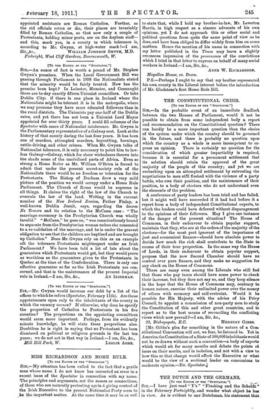THE CONSTITUTIONAL CRISIS.
[To THE EDITOR OF THE " SPECTATOR."]
SIR,—In the probable event of an immediate deadlock between the two Houses of Parliament, would it not be possible to obtain from some independent body a report and recommendation on the Constitutional question P There can hardly be a more important question than the choice of the system under which the country should be governed in the future, and there is probably no question upon which the country as a whole is more incompetent to ex- press an opinion. There is certainly no question for the consideration of which greater impartiality is required, because it is essential for a permanent settlement that its solution should retain the approval of the great majority of the people of this country; and yet we are embarking upon an attempted settlement by entrusting the negotiations to men still flushed with the violence of a party battle, who owe their position, and the maintenance of their position, to a body of electors who do not understand even the elements of the problem.
A conference of party leaders has been tried and has failed, but it might well have succeeded if it had had before it a report from a body of independent Constitutional experts, to which the leaders could have deferred without disparagement to the opinions of their followers. May I give one instance of the danger of the present situation P The House of Commons, in their endeavour to obtain popular support, maintain that they, who are at the orders of the majority of the electors—for the most part ignorant of the importance of just and economical finance—should have absolute power to decide how much the rich shall contribute to the State in excess of their true proportion. In the same way the House of Lords, in their endeavour to obtain popular support, propose that the new Second Chamber should have no control over pure finance, and they make no suggestion for any check on the House of Commons.
There are many even among the Liberals who still feel that those who pay taxes should have some power to check their increase, but they dare not say so, and they keep silence in the hope that the House of Commons may, contrary to human nature, exercise their unlimited power over the money of others with economy and self-restraint. Would it be possible for His Majesty, with the advice of his Privy Council, to appoint a commission of non-party men to study the Constitution of this and other great countries, and to report as to the best means of reconciling the conflicting views which now prevail P-1 am, Sir, dre., [Mr. Gibbs's plea for something in the nature of a Con. stitational Convention will not, we fear, be listened to. Yet in America the Constitution of a State of 300,000 inhabitants would not be re-drawn without such a convention—a body of experts which would sit for many months and debate the points at issue on their merits, and in isolation, and not with a view to how this or that change would affect the Executive or what would be the view of a sectional leader on concessions to moderate opinion.—En. Spectator.1






































 Previous page
Previous page